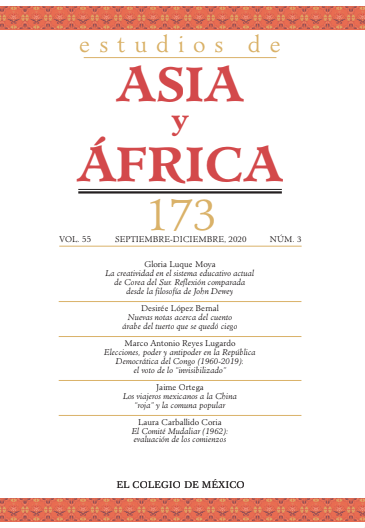Abstract
“A Maverick Pig” is an essay by Chinese cult writer Wang Xiaobo (1952-1997) that was first published in 1996 in 三联生活周 刊 [Life Weekly] magazine. It describes the adventures of a pig the pet of educated young men—which is different from the others: an agile, vivacious, and intelligent creature that manages to get away with things. For the local people, the pig is a scourge.References
Berry, M. (2005). Wang Xiaobo. En E. L. Davis. (Ed.). Encyclopedia of Contemporary Chinese Culture (p. 889). Nueva York, Estados Unidos: Routledge.
Botton Beja, F. (2008). Tendencias de la literatura china moderna. En R. Cornejo (Ed.), China: Radiografía de una potencia en ascenso (pp. 737-750). México, México: Colegio de México.
Jung C. (Prod.) y Yuan Z. (Dir.) (1996). 东宫西宫 Dong gong xi gong [Palacio del Este, Palacio del Oeste] [cinta cinematográfica]. China: Amazon Entertainment Ltd.
Kafka, F. (2003). El Castillo. Madrid: Cátedra.
King, R. (2013). Milestones on a Golden Road: Writing for Chinese Socialism 1945-80. Vancouver: UBC Press.
Li, Y. y Wang, X. 李银河 王曉波 (1992). Tamen de Shijie – Zhongguo nan tongxinlian qunluo toushi (他们的世界——中国男同性恋群落透视) [Su mundo: Perspectivas sobre la comunidad homosexual en China]. Taiyuan, China: Shanxi Renmin Chubanshe.
Orwell, G. (2010). 1984. Barcelona: Destino.
Orwell, G. (2010). Rebelión en la Granja. Barcelona: Austral.
Shernuk, K. y Suher, D. (2017). From the margins to the mainstream: A tale of two Wangs. En D. Der-wei Wang. (Ed.), A New literary history of modern China (pp.821-826). Cambridge, MA: The Belknap Press of Hardvard University Press. https://doi.org/10.4159/9780674978898-141
Wang X. 王小波 (1992). Huángjīn shídài 黄金时代 [La edad de oro]. Taipéi: Taiwan Lian jing Chubanshe.
Wang X. 王小波 (1995). Weilai Shijie 未来世界 [El mundo futuro]. Taipéi: Taiwan Lian jing Chubanshe.
Wang X. 王小波 (1996a). Yi zhi duli duxing de zhu 只特立独行的 猪 [Un cerdo inconformista]. Life Weekly (11).
Wang X. 王小波 (1996b). Siwei de lequ 思维的乐趣 [El placer de pensar]. Taiyuan: Beiyue Wenyi Chubanshe.
Wang X. 王小波 (1997a). Báiyín shídài (白银时代) [La edad de plata]. Guangzhou: Huacheng Chubanshe.
Wang X. 王小波 (1997b). Chenmo de daduoshu 沉默的大多数 [La mayoría silenciosa]. Beijing: Zhongguo Qingnian Chubanshe.
Wang X. 王小波 (1998). Heitie shídài 黑铁时代 [La edad de hierro]. Changchún: Shidai Wenyi Chubanshe.
Wang X. 王小平 (2012). Wo de xiongdi Wang Xiaobo 我的兄弟 王小波 [Mi hermano Wang Xiaobo]. Nankín: Jiangsu Wenyi Chubanshe.
This work is licensed under a Creative Commons Attribution-NonCommercial-NoDerivatives 4.0 International License
Copyright 2022 Estudios de Asia y África



